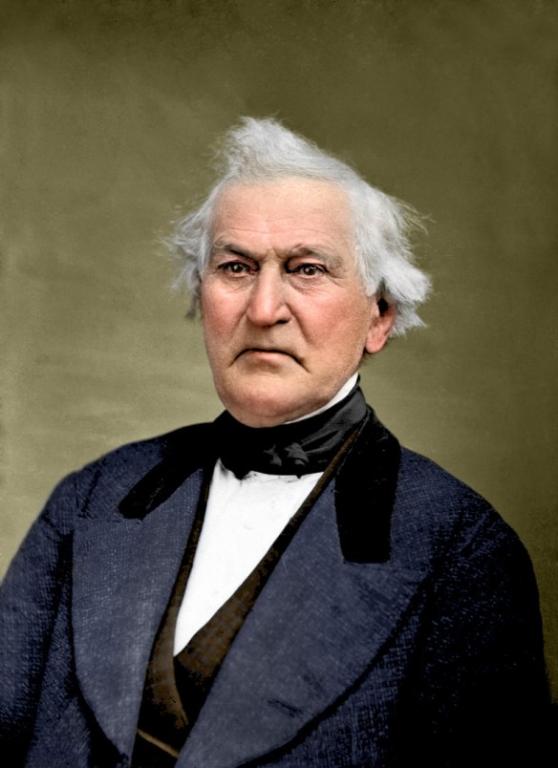
(From the Interpreter Foundation, colorized by Bryce Haymond)
In August 1883, David Whitmer, the last surviving Witness of the Book of Mormon plates, spoke with a prominent member of the Church of Jesus Christ of Latter-day Saints by the name of James H. Hart (1825-1906), who was searching, at the time, for portraits of the Three Witnesses for the YMMIA’s publication, The Contributor. Hart, who was then the Church’s immigration agent in New York City, traveled to Missouri to secure and later to return a photograph of Oliver Cowdery that was in the possession of Cowdery’s daughter. (Cowdery had died at David Whitmer’s home on 3 March 1850.) While he was there, Hart took advantage of the opportunity to interview Whitmer. As a former journalist, Hart knew Pitman short hand and took the interview down verbatim. From his Pitman notes Hart produced two articles (one of which was published in the Deseret News) and a narrative poem. On a subsequent visit, Hart read the poem to Whitmer, who, he said, approved it.
The paragraph above is adapted from “Literary Joseph Fielding Smith #09: James H. Hart’s Interview with David Whitmer,” by Kent Larsen (kindly brought to my attention by Justin Hart; James Henry Hart was his great great grandfather). The entire poem may be found in the Larsen article. Here, I cite from the conclusion of that article:
While Hart’s poetry isn’t on par with the best of his day, even among Mormons, (it is better than most) still he has moments when his reworking of Whitmer’s words adds some power, if not beauty:
- “If this be not truth, there is no truth,
- And I have been mistaken from my youth.
- If I’m mistaken, you may know from hence
- That there’s no God, no law, no life, no sense.
- “I know there is a God-I’ve heard his voice,
- And in his power and truth do still rejoice;
- Though fools may ridicule and laugh to-day,
- They yet shall know the truth of what I say.
I particularly like these two stanzas, which seem to me like the heart of the poem:
- “No tongue can tell the glory and the power
- That was revealed to us in that blest hour.
- The plates of brass and gold, with angel’s care,
- Were placed before us as we waited there.
- “We saw the fine engravings on them, too,
- And heard the voice declare the book was true.
- And what we saw and heard was by the grace
- Of Him who died to save the human race.
And surely Hart’s description of the gentile doctor (apparently Oliver Cowdery’s son-in-law and Whitmer’s Nephew-in-law, Dr. Charles Johnson) should be better known:
- I asked a Gentile doctor, and was told
- That David Whitmer’s word was good as gold.
- “His honesty is fairly crystallized-
- His name will ever be immortalized.
- “Although its all a mystery to me,
- I know he’s honest as a man can be;
- I’d stake upon his word my very life,
- And so would this my good and noble wife.”











